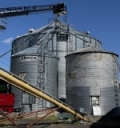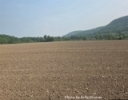Grains
 Grain crops such as corn, soybeans and small grains are grown on over 100,000 acres in the five county area of Allegany, Cattaraugus, Chautauqua, Erie, and Steuben each year.
Grain crops such as corn, soybeans and small grains are grown on over 100,000 acres in the five county area of Allegany, Cattaraugus, Chautauqua, Erie, and Steuben each year. Relevant Events
2026 No-Till & Cover Crop Conference
February 19, 2026 : 2026 No-Till & Cover Crop Conference
South Burlington, VT
NYSDEC How to Get Certified Course
March 3, 2026 : NYSDEC How to Get Certified Course
Ellicottville, NY
Mid Atlantic Grain Conference
March 15 - March 16, 2026
Drones in Agriculture: Exploring Opportunities
Katelyn Miller, Field Crops and Forage Specialist
Southwest New York Dairy, Livestock and Field Crops Program

A follow up article to "Drones in Agriculture" in October 2024, this article dives into the opportunities to integrate drones into spray programs.
Framing the Discussions on BMR Corn

In the spring of 2025, Corteva announced they would discontinue the development of brown midrib (BMR) corn products. As numerous discussions on the topic have unfolded over the last several months, it has been apparent that sometimes the framing of the questions are not leading to the most productive discussions or decisions for a farm. Check out this article for important considerations for strateggizing forage plans for your farm.
What You Need to Know about the USDA's Farmer Bridge Assistance Program
Kate McDonald Polakiewicz, Farm Business Management Specialist
Southwest New York Dairy, Livestock and Field Crops Program
The US Department of Agriculture's Farmer Bridge Assistance (FBA) Program announced $12 billion in aid for US farmers this past December. Here's what you need to know.
Don't Put All Your Seeds in One Basket
Katelyn Miller, Field Crops and Forage Specialist
Southwest New York Dairy, Livestock and Field Crops Program

While harvest has stretched on for many, attention is beginning to shift toward planning for the 2026 growing season. This article highlights key factors to consider as seed ordering approaches, helping ensure selections align with field conditions and production goals.
The Tillage Toolbelt: Pest Management
Rounding out the final article in this series on till vs no-till, we're finally focusing on how your tillage decisions can impact the pest pressures on your farm. Your tillage decisions present different challenges and opportunities as it relates to pest management.
Looking Past the Bin Door
Katelyn Miller, Field Crops and Forage Specialist
Southwest New York Dairy, Livestock and Field Crops Program

As grain enters the bins, I've been having more frequent conversations about commodity marketing. There is no one size fits all approach, but one thing remains the same: understanding your cost of production is the foundation of every sound management decision.
Governor Hochul Announces Two Grant Opportunities
Governor Hochul has announced two grant opportunities to help address the impacts of climate change and protect water quality. Funding is available in four tracks: Livestock Management (alternative waste and precision feeding management), Adaptation and Resiliency, Healthy Soils, and Agricultural Forestry Management. Contact your local Soil & Water Conservation office for more information.
The Tillage Toolbelt: Soil Structure

Continuing this series from last month, we're taking a look at all of the differences between tilling and no-till systems to help you figure out which system is best for your farm. We previously looked at how tillage decisions impact nutrient cycling, and this time we're considering how the same decisions can change soil structure. Your choice to till or not to till can significantly change your soil structure, determining what kinds of challenges may appear or which may be avoided.
The Tillage Toolbelt: Nutrient Cycling
The decision to till or no-till is not a one size fits all approach. This article series aims to clear up some of the confusion about the ways that tillage (or a lack thereof) impacts our fields, and how the challenges you face could determine whether it's the right move for you.
Combine Adjustments to Minimize Corn Harvest Losses

Volunteer corn infestations popping up in your crop rotation can reduce crop yield and require additional herbicide considerations. Now is the time to prepare for harvest by calibrating your equipment to minimize harvest losses.
Grants & Incentives for New York Agriculture
By Farm Credit East
There are a number of grants and incentives available for Northeast agriculture businesses, but learning about their availability and navigating the application process can be a challenge. To help with this, Farm Credit East has released an update to its report identifying federal, regional and state grants, loan guarantees, and other incentives available to assist Northeast producers of all types and sizes.
This post is an excerpt from the document, focusing on funding opportunities available in New York. Find a full list of opportunities, including sector-specific opportunities for states including, but not limited to New York, see here.
Budgeting and proposing operational changes to or with senior management
By Jason Karszes
On more and more dairy farms every year, employees play integral roles in day-to-day operations, decision making, and problem solving. In these roles, ideas for changes to operations and for capital investments are generated. While these ideas might be quite important to the middle manager for their area, across the farm other opportunities in support of the overall priorities and mission of the farm also need to be considered.
Proposing change to the leadership of the farm, or as part of the leadership team, is typically an essential step to improve farm operations. Developing proposals in support of the change can help with identifying all the potential risks and returns and decision-making by the senior management team. Several key areas to address in the proposal are laid out below.
Upcoming Events
Piglet Health 101
February 13, 2026 : Piglet Health 101 - Batavia, NY
Batavia, NY
Boots in the Barn: Cornell Dairy Research Updates
January 13, 2026
January 20, 2026
January 27, 2026
February 3, 2026
February 10, 2026
February 17, 2026
February 24, 2026
2026 No-Till & Cover Crop Conference
February 19, 2026 : 2026 No-Till & Cover Crop Conference
South Burlington, VT
Announcements
Cows, Crops & Critters Newsletter Sponsorship
TRYING TO REACH GROWERS AND AGRIBUSINESSES IN OUR SOUTHWEST REGION OF NEW YORK?Weekly Email Update: Shared with 625+ households who have signed up with our program.
Monthly Paper Mailer: To reach our stakeholders and farmers who lack internet access, we send out a monthly mailer where your company's logo and contact information would be featured with a mailing list of 330+ households.
If you sponsor our weekly and monthly publications you reach approximately 955 households.





